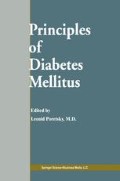Abstract
Diabetes is a life-long disease managed primarily by the individual.1 The key to successful self-management of this chronic disease is to provide the individual with knowledge, psychomotor skills, and effective psychological coping to facilitate lifestyle modification.2 The process of adult learning is not an exact science. It is highly individualized. Oftentimes the clinician would find that strategies successful for one person might not be successful for others.
Access this chapter
Tax calculation will be finalised at checkout
Purchases are for personal use only
Preview
Unable to display preview. Download preview PDF.
References
Anderson RM, Funnell MM. Theory is the cart, vision is the horse: reflections on research in diabetes patient education. The Diabetes Educ 25: 43–51, 1999.
Funnel MM, Anderson RM. The art of empowerment: stories and strategies for diabetes educators. Alexandria, VA. American Diabetes Association, 2000.
Wagner EH. Chronic disease management: What will it take to improve care for chronic illness? Effect Clinical Practice 1: 2–4, 1998.
Wagner EH, Austin B, Von Korff M. Improving outcomes in chronic illness. Manag Care Q 4: 12–25, 1996.
Redman BK. The process of patient education. 7th ed. St. Louis, Mosby, 1993.
Mensing C, Boucher J, Cypress M et al. National Standards for Diabetes Self-Management Education. Diabetes Care 23: 682–689, 2000.
Walker EA. Characteristics of the adult learner. The Diabetes Educ, 25: 16–24, 1999.
Knowles M. The adult learner: A neglected species. 4th ed. Houston, TX, Gulf Publishing Co, 1990.
Knowles M. Self-Directed Learning. Chicago, Follett; 1975.
Tough A. How adults learn and change. The Diabetes Educ 11: 21–25, 1985.
Brookfield SD. The skillful teacher: on techniques, trust, and responsiveness in the classroom. San Francisco, CA, Jossey-Bass, 1990.
Darkenwald GG, Merriam SB. Adult Education Foundation of Practice. NY, Harper Collins Publishing, Inc, 1982.
Brookfield SD. Understanding and facilitating adult learning: A comprehensive analysis of principles and effective practices. San Francisco, CA, Jossey-Bass, 1986.
Mezirow, J. Transformative Learning: A guide for educators of adults. San Francisco, CA, Jossey-Bass, 1991.
Peyrot M. Behavior change in diabetes education. The Diabetes Educ. 25: 62–73, 1999.
Prospect Associates. Final Report: Survey of physician practice behaviors related to the treatment of people with diabetes mellitus (endocrinologists). Doc#NO1DK82233, NIDDK, NIH, 1991.
Walker EA, Wylie-Rosett J, Shamoon H. Health education for diabetes self-management. In Porte D, Sherwin R, Rifkin H. eds. Ellenberg and Rifkin’s Diabetes Mellitus, 5th ed. Stanford, Conn, Appleton and Lange 1341–1351, 1997.
Anderson RM, Funnell MM. The role of the physician in patient education. Practical Diabetology 9: 10–12, 1990.
Brown SA. Interventions to promote diabetes self-management: State of the Science, The Diabetes Educ, 26 (6), 52–61, 1999.
Walker EA. Health behavior: from paradox to paradigm. Diabetes Spectrum 14 (1): 6–8, 2001.
Kirsch,I, Jungeblut, A. Jenkins L., Kolstad, A. Adult Literacy in America: A first look at the findings of the National Adult Literacy Survey. Washington, D.C.: National Center for Education Statistics, US Department of Education, 1993.
American Medical Association. Health Literacy: Report of the Council on Scientific Affairs. JAMA 281 (6): 552–557, 1999.
National Academy on an Aging Society. Understanding health literacy: New estimates of the costs of inadequate health literacy. 1998.
Overland JE, Hoskins PL, McGill MJ, Yue DK: Low literacy: A problem in diabetes education. Diabetic Med 10: 847–850, 1993.
Williams MV, Parker RIVI, Baker DW, et al. Inadequate functional health literacy among patients at 2 public hospitals. JAMA 274: 1677–682, 1995.
Mendoza MA. A study to compare inner city black men and women completers and non-attenders of diabetes self-care classes. Doctoral Dissertation. Teachers College, Columbia University, 1999.
Stanley K. Low-literacy materials for diabetes nutrition education. Practical Diabetology 36–44, 1999.
Walker EA, Mendoza MA. the strength of many voices: a review of the johns hopkins guide to diabetes. Diabetes Spectrum 11: 192–193, 1998.
American Diabetes Association. Diabetes 1995 Vital Statistics. Alexandria, VA, Author, 1996.
United States Department of Health and Human Services. Secretary’s Task Force on Black and Minority Health, Vol I-VIII. Washington, D.C., U.S. Government Printing Office, 1985–1986.
Leininger M. Leininger’s Acculturation health care assessment tool for cultural patterns in traditional and nontraditional pathways. J Transcultural Nurs 2 (2): 40–42, 1991.
Tripp-Reimer T. Cultural assessment. in nursing assessment: a multidimensional approach. Bellack J, Bamford P, Eds. Monterey, CA, Wadsworth Health Services 226–246, 1984.
Tripp-Reimer T, Choi E, Kelley S, and Enslein, JC. cultural barriers to care: inverting the problem. Diabetes Spectrum 14 (1): 13–22, Winter 2001.
Glasgow RE, Toobert DJ, Hampson SE, Brown JE, Lewinsohn PM, Donnelly J. Improving self-care among older patients with type II diabetes: the “sixty-something…” study. Patient Educ and Counseling 19: 16–24, 1992.
Smith DL. Patient education: tuning in to the needs of the elderly. Med Times 114: 27–31, 1986.
Templeton CL. Nutrition education: the older adult with diabetes. Diabetes Educ 17: 355–358, 1991.
White JR. The elderly patient with diabetes. Profile, Spring, 3–8, 1992.
Feil EG, Glasgow, RE, Boles S, McKay G. Who participates in internetbased self-management programs? A study among novice computer users in a primary care setting. The Diabetes Educ 26 (5): 806–811, 2000.
IntelliQuest, Worldwide Internet/Online Tracking Service (WWITS). 1998. Available at: http://www.intelliquest.com/.
Howe L. Patients on the Internet: a new force in healthcare community building. Medicine on the Net. November 1997. Available at: http://www.mednet-i. com.
Doak CC, Doak LG, Root J. Teaching patients with low literacy skills. 2 ed. Philadelphia, Pennsylvania, JB Lippincott Co, 1996.
Editor information
Editors and Affiliations
Rights and permissions
Copyright information
© 2004 Springer Science+Business Media New York
About this chapter
Cite this chapter
Mendoza, M.A., Walker, E.A. (2004). Behavioral and Educational Approaches to Diabetes Self-Management. In: Poretsky, L. (eds) Principles of Diabetes Mellitus. Springer, Boston, MA. https://doi.org/10.1007/978-1-4757-6260-0_28
Download citation
DOI: https://doi.org/10.1007/978-1-4757-6260-0_28
Publisher Name: Springer, Boston, MA
Print ISBN: 978-1-4757-6262-4
Online ISBN: 978-1-4757-6260-0
eBook Packages: Springer Book Archive

